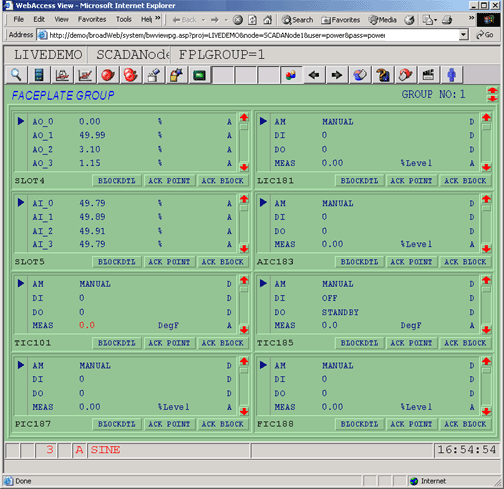Faceplate Display Groups are a system Template display providing summary all parameters in a Block Tag. Up to 8 Blocks per Faceplate Group. All parameters of the tags are listed (a scroll bars appear for large Blocks). Faceplate Groups allow a large number of Tags to be displayed in a without Graphics Building.
One display template can show all the Tag and Blocks Tags in your system. You build Faceplate Groups by listing the tagnames in a list. The Over view groups use the same list.
The keymacro <F2> and the
faceplate icon ![]() on the toolbar call a list of Faceplate Group
Displays. Faceplate Groups can also be called from the
Overview Display, by clicking on the Group number field.
on the toolbar call a list of Faceplate Group
Displays. Faceplate Groups can also be called from the
Overview Display, by clicking on the Group number field.
The Overview -> Faceplate Group -> Block Detail -> Point Detail hierarchy is automatic and provides a “drill down” feature to more detailed information, similar to DCS systems.
The each Faceplate Group display lists the value for Tags and the parameters of Block Tags. The default Faceplate Group Displays are Text Displays. They can be modified using DRAW to create Fills, Bars and other graphical representations. The Faceplate Template source is fplgrp.dxx
The Faceplate Group Display shows Parameter Name, Current Value, Engineering Units and data type (A for Analog, D for Discrete and T for Text).

Figure 5-28Faceplate Group Display
Clicking the button labeled BLOCKDTL will call up the Block Detail Display, if a Block Detail Display has been built for the Block Type. The Block Detail Display must be named after the Block Type.
Clicking the Acknowledge Point button will acknowledge the Alarm of only the selected Parameter in the Block. To acknowledge the alarm of only one parameter of Block:
1. Scroll down to the Parameter
2. Click on the Parameter Name (or anywhere on that line)
3. Click ACK Point
Clicking the Acknowledge Block pushbutton will acknowledge all active Alarms in the Alarm Group of the Selected Tag. There can be up to 100 Tags in an Alarm Group.